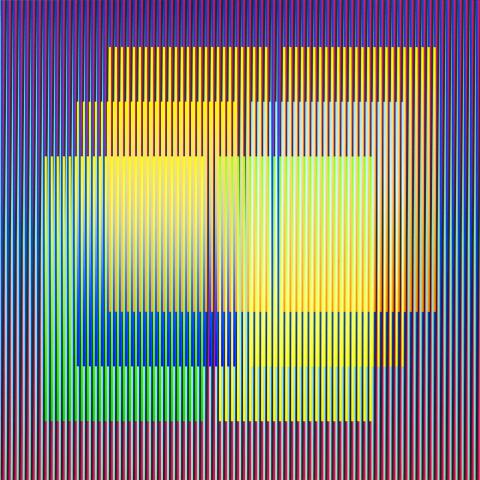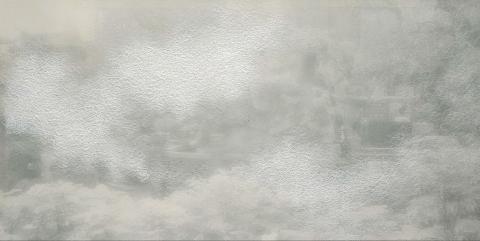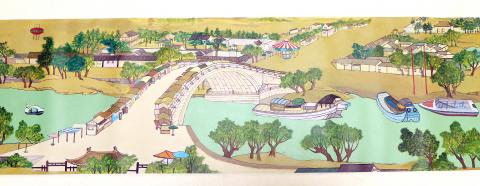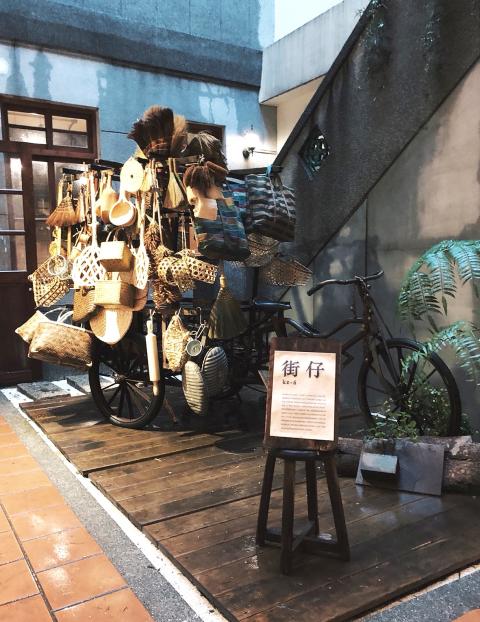This weekend, Galerie Nichido Taipei (台北日動畫廊) opens a rare group exhibition of modern and contemporary works from Japan, Okinawa, Taiwan and Vietnam. Curated by Gong Jow-jiun (龔卓軍), Air Surprise: An Aerial View of Heterogeneous Landscapes in Modern and Contemporary Taiwan and Japan (向空中突襲: 台日現當代異質風景的藝術鳥瞰) features landscapes from early 20th century to the present that push the boundaries of art language and historical perspectives. Japanese painter Ryuzaburo Umehara’s oil painting Beijing View depicts the artist’s perspective of Beijing’s Forbidden City from his elevated hotel room. In this painting, the empty sky dominates the composition while the Chinese palace plays an accompanying role in the overall scenery. Chuang Tsung-hsun (莊宗勳) also references Beijing’s authority in his scroll painting Along the River Park During the Qingming Festival, Closed (清明上河園區。今日公休), in which he adds contemporary features to a treasured Qing Dynasty landscape panorama housed in the National Palace collection. Kiyoko Sakata’s Hair Brush No.10 is an absurdist hair comb that poetically addresses Okinawa’s complex relationship with Japan. Providing multiple perspectives, the exhibition explores the historical issues of imperialism, war, colonial domination and the cultural relationship between Japan, Taiwan and China.
■ Galerie Nichido Taipei (台北日動畫廊), 3F-2, 57 Dunhua S Rd Sec 1, Taipei City (台北市敦化南路一段57號3樓之2), tel: (02)2579-8795. Open Tuesdays to Saturdays from 11am to 7pm
■ Through Jan. 13

Photo courtesy of Puerta Roja
One of Taipei’s main art staples, Chi-Wen Gallery (其玟畫廊), will be opening its new Tianmu space this weekend with a punk-spirited group show Parklife. Taking its title from a Blur song of the same name, the exhibition reflects upon the unique urban setting of Tianmu and look towards the prospects of future engagement with its community. The new gallery space is a former residential house that has a history of foreign tenants. Retaining its function as living quarters, owner Joanne Huang (黃其玟) keeps the space casual and hopes to run it as if she were inviting artists and guests into her space for art occasions. The opening exhibition features 20 artists, including a screening of Chang Chien-chi’s (張乾琦) film The War That Never Was, Heidi Voet’s meticulous sculptures made out of plastic bags and a special performance by sound artist Huang Da-wang (黃大旺).
■ Chi-Wen Gallery (其玟畫廊), 1F, 32 Lane 2, Zhongshan N Rd Sec 6, Taipei City (台北市中山北路六段2巷32號1樓), tel: (02)2837-0237. Open Tuesdays to Saturdays from 1pm to 6pm.
■ Today through Nov. 30 (Opening today and tomorrow)

Photo courtesy of Nunu Fine Art
Entering its 24th edition this year, Art Taipei boasts participation of 123 galleries that collectively showcase a range of 3,000 works from artists worldwide. Visitors may expect a mix of distinguished galleries operating within the Asian regions, including Chinese heavy hitters ShanghArt (香格納畫廊) and Beijing Commune (北京公社). ShanghArt is showing renowned painter Geng Jianyi (耿建翌) and younger contemporaries Li Shan (李山) and Chen Wei (陳維). Beijing Commune is returning this year with its repertoire of new generation artists, including Hu Xiaoyan (胡曉媛), Wang Guangle (王光樂) and Yang Xinguang (楊心廣). Taiwanese strongholds Eslite Gallery (誠品畫廊), Lin & Lin Gallery (大未來林舍畫廊), Asia Art Center (亞洲藝術中心) and SOKA Art Center (索卡藝術中心) are also offering a range of modern and contemporary works. Lin & Lin is presenting an interesting lineup of artists including Sanyu (常玉), Hsia Yan (夏陽), Chen Chieh-jen (陳界仁), Kuo Wei-kuo (郭維國) and Liu Wei (劉煒). In addition to the main gallery section, also check out the fair’s public art program curated by Annie Ivanova, as well as the emerging artist program that includes eight solo exhibitions of upcoming artists to watch.
■ Taipei World Trade Center Hall Exhibition Hall 1 (台北世界貿易中心一館), 5 Xinyi Rd Sec 5, Taipei City (台北市信義路5段5號), tel: (02) 2725-5200.
■ Today through Monday (Today from 2pm to 7pm; tomorrow and Sunday from 11am to 7pm; Monday from 11am to 6 pm)

Photo courtesy of Ga
As part of the Tua-Tiu-Tann International Art Festival (大稻埕國際藝術節), Tua-Tiu-Tann Aramono Exhibition: Taiwanese Daily Objects (大稻埕荒物展:台灣人的日常器物) presents local and imported arts and crafts that tend toward the Japanese tradition of Aramono. Literally translated as “primitive objects,” Aramono is a craft discipline that promotes an unpolished and natural aesthetic. From hand-made wooden spoons, metal pots and plates, ceramic tea ware to bamboo woven baskets, the show includes a range of daily artifacts that have played an intimate role in Taiwanese life over the last century. The show includes objects created by young and old craftspeople, including senior artists from Dadaocheng (大稻埕), a historical area known for its preservation of traditional crafts. The show is accompanied by weekend workshops that offer hands-on experience of Aramono crafts.
■ Earthing Way (地衣荒物), 34 Minle St, Taipei City (台北市民樂街34號), tel: (02) 2550-2270. Open Wednesdays to Mondays from 10:30am to 7:30pm
■ Through Nov. 30

Photo courtesy of Earthing Way
Lin Tian-miao (林天苗) is a prominent Chinese female contemporary artist active since the 1980s. Catch her first Taipei solo exhibition at Nunu Fine Art (路由藝術), which includes works from her iconic series Seeing Shadows (看影) that feature atmospheric scenery inlaid with cotton and silk thread. Lin is known for her masterful use of thread to create monochromatic and often haunting installations that speak to her identity as a woman. She uses thread as a way of reclaiming her relationship with the past; as a young child, her mother would task her with spooling cotton. In her artistic practice today, the process of winding thread around objects allows Lin to enter a space for self-reconciliation. Her solo exhibition features a range of sensibilities; from subtle manipulations of thread and cloth to more colorful castings in resin. In More or Less the Same (可能一樣), Lin presents a surreal archeology of miniature sculptures that combine the form of human bones and machine parts.
■ Nunu Fine Art (路由藝術), 5, Ln 67, Jinshan S Rd Sec 1, Taipei City (台北市金山南路一段67巷5號), tel: (02) 3322-6207. Open Wednesdays to Sundays from 12pm to 7 pm
■ Tomorrow through January

May 18 to May 24 Pastor Yang Hsu’s (楊煦) congregation was shocked upon seeing the land he chose to build his orphanage. It was surrounded by mountains on three sides, and the only way to access it was to cross a river by foot. The soil was poor due to runoff, and large rocks strewn across the plot prevented much from growing. In addition, there was no running water or electricity. But it was all Yang could afford. He and his Indigenous Atayal wife Lin Feng-ying (林鳳英) had already been caring for 24 orphans in their home, and they were in

President William Lai (賴清德) yesterday delivered an address marking the first anniversary of his presidency. In the speech, Lai affirmed Taiwan’s global role in technology, trade and security. He announced economic and national security initiatives, and emphasized democratic values and cross-party cooperation. The following is the full text of his speech: Yesterday, outside of Beida Elementary School in New Taipei City’s Sanxia District (三峽), there was a major traffic accident that, sadly, claimed several lives and resulted in multiple injuries. The Executive Yuan immediately formed a task force, and last night I personally visited the victims in hospital. Central government agencies and the

Australia’s ABC last week published a piece on the recall campaign. The article emphasized the divisions in Taiwanese society and blamed the recall for worsening them. It quotes a supporter of the Taiwan People’s Party (TPP) as saying “I’m 43 years old, born and raised here, and I’ve never seen the country this divided in my entire life.” Apparently, as an adult, she slept through the post-election violence in 2000 and 2004 by the Chinese Nationalist Party (KMT), the veiled coup threats by the military when Chen Shui-bian (陳水扁) became president, the 2006 Red Shirt protests against him ginned up by

As with most of northern Thailand’s Chinese Nationalist Party (KMT) settlements, the village of Arunothai was only given a Thai name once the Thai government began in the 1970s to assert control over the border region and initiate a decades-long process of political integration. The village’s original name, bestowed by its Yunnanese founders when they first settled the valley in the late 1960s, was a Chinese name, Dagudi (大谷地), which literally translates as “a place for threshing rice.” At that time, these village founders did not know how permanent their settlement would be. Most of Arunothai’s first generation were soldiers